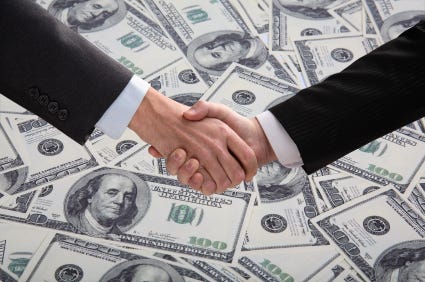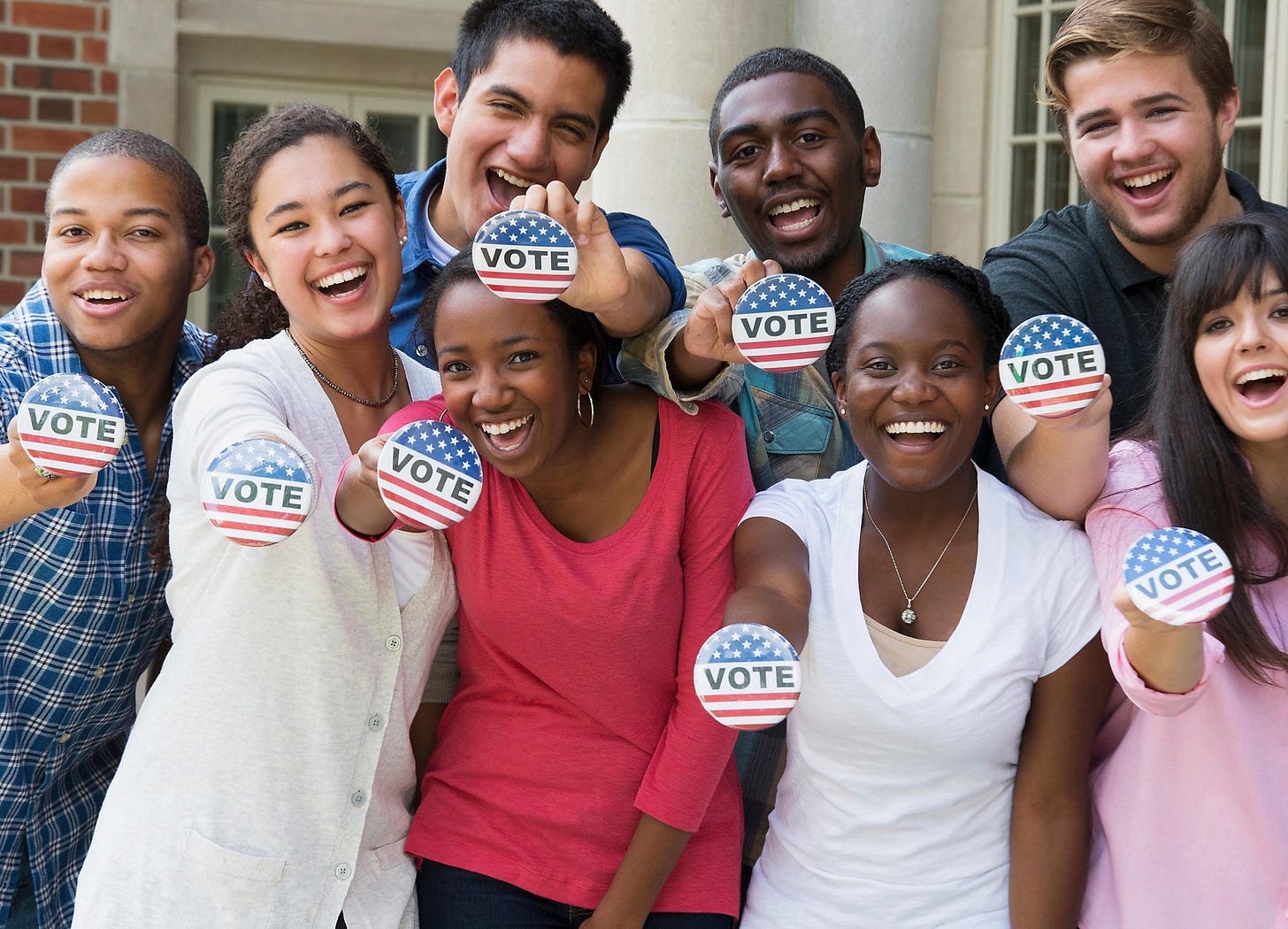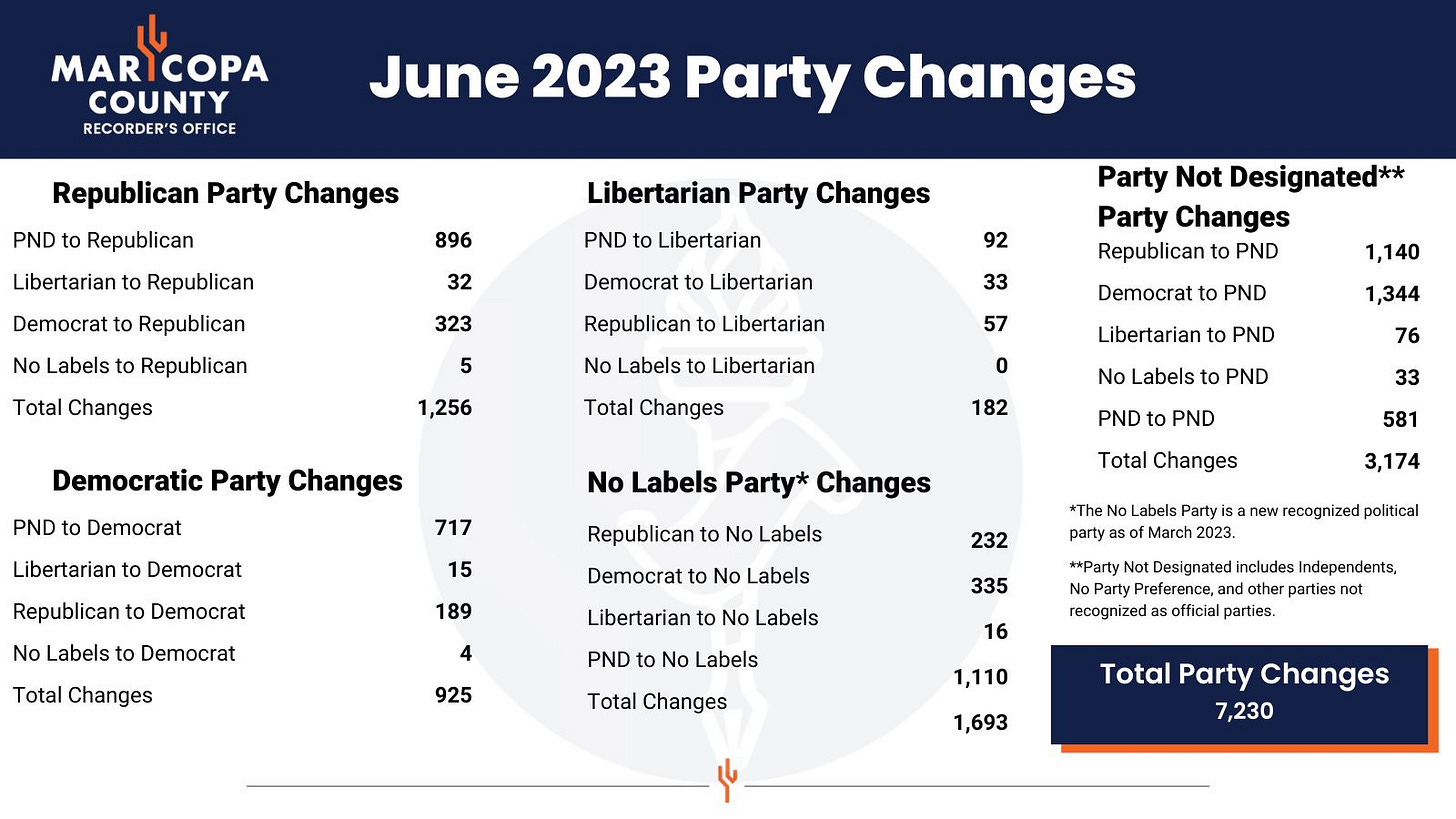No Labels = No Thanks
Sick of partisan nonsense? A "centrist" party sounds so tempting...but buyer beware.
Built Around a Statistical Myth
4,453 residents of Maricopa County are now registered with the No Labels "party." Some of those residents have probably been bamboozled by the myth that this represents a moderate, centrist option.
There’s a fundamental fallacy at the heart of a “centrist” party built from people who somehow can’t tell the difference between Donald Trump and Joe Biden. To view this as a voting bloc, however, is ludicrous — the “plague on both your houses” constituency ranges from idealistic young people to sour libertarians, and the likelihood that they would unite behind any candidate is nil. No Labels has thus far flirted with now-Independent Sen. Kyrsten Sinema (whose net favorability is -23 according to a recent poll), Larry Hogan (the Republican Maryland governor who vetoed bills expanding abortion access), and Joe Manchin (a stalwart fossil fuels advocate and perennial obstacle to popular social policies).
Independents, “moderates,” those with “no party affiliation,” and “centrists” are no more similar to each other than Republicans are to Democrats. Averaging these wildly different viewpoints is about as accurate as the joke about Bill Gates walking into a corner bar and raising the average occupants’ income. Writes Geoffrey Skelley in fivethirtyeight.com, “Even if we often describe these voters as centrists, many hold inconsistent ideological positions on issues that only average out to ‘moderate.’ “ In Vox, Ezra Klein wrote in 2015, “There is no creature more revered in American politics than the moderate voter… The only problem is moderates are largely a statistical myth.”
“These voters don't want moderate candidates because these voters aren't actually moderates.” —Ezra Klein, Vox
Writing in the conservative National Review, Rich Lowry concurs: “Whatever else we can say about the nation at this time of chaos and division, it is not turning its lonely eyes to Sen. Joe Manchin.” Manchin has the conceit that he is “a unifying force occupying the neglected center,” but it seems more likely he would unite voters who hate his positions on abortion, oil and gas, the filibuster, guns, and immigration.
The Wealth and Power Behind No Labels
No Labels is skirting campaign finance laws that require disclosing donors because they have no candidates (yet) and so can masquerade as a nonprofit — a “dark money” group that hides its finances. Reporting by Mother Jones indicates that recent donors to No Labels include big-money chief executives of Loews Corp, Abry Partners (private equity), tech giant SailPoint, and Fortress Investment Group. Others include donors to Mitch McConnell’s Senate Leadership Fund and other Republican super-PACs, many donors to Sinema, and donors across the political spectrum. Another known donor is Harlan Crow, the billionaire benefactor of Clarence Thomas. Peter Thiel, who funded the campaigns of Blake Masters (Arizona Senate) and J.D. Vance (Ohio Senate), has also donated.
In the post-Citizens United political world we find ourselves in, money talks–and corporate money shouts the loudest. Says David Broockman, a political scientist at UC Berkeley, "When we say moderate what we really mean is what corporations want.” It seems plausible that No Labels is “paving the way for a candidate who will not challenge the current constellation of wealth and power,” writes Sue Halpern in The New Yorker.
Duping America's Youngest Voters
So what is the No Labels party platform? We downloaded the No Labels Policy Handbook, and discovered a mix of economic austerity, reduction of the corporate tax rate, forcing the unemployed to earn benefits by job-seeking, block grants to states to assist with child care, reducing regulation (in fact, sunsetting ALL regulations), decentralizing federal government, a forcibly balanced budget (which stifles investment, as anyone who has a home mortgage knows), and a brief nod to sustainable energy. It sounds like a corporate wet dream.
America's youngest voters ages 18-29 (also called Gen Z or "Plurals") could be susceptible to the false lure of a No Labels party, since “no labels” is pretty much their identity. Young voters have rising mistrust of both parties and are frustrated by the polarization and stagnation of recent years. Issues such as climate change, LGBTQ+ equality, structural racism, and affordable housing and health care galvanize Plurals, but they are less likely to connect those issues with a specific Party. Ruby Belle Booth is the elections coordinator for the Center for Information and Research on Civic Learning Engagement (CIRCLE), part of the Tisch College of Civic Life at Tufts University. She writes, “Starting with millennials we see a movement away from a lot of traditional institutions, both politically and otherwise, that has continued into Gen Z. You see it with religion and marriage, and you also see it with political parties.”
Just One Big Spoiler
All the secrecy and prevarication of the No Labels party has fueled speculation that it is simply serving as a spoiler in the upcoming presidential election, thus raising the likelihood of a potential second Trump term. An April 14 editorial in the Washington Post by leaders of three groups representing various segments of the Democratic Party coalition sounds the alarm that No Labels raises “the possibility of a well-financed third-party presidential campaign that could help elect a MAGA extremist president in 2024.”
"Poll data suggesting a No Labels campaign would hurt Biden more than Trump...has prompted Democratic strategists to speculate that this endeavor is a not-too-secret project to elect Trump or another Republican." --David Corn and Russ Choma in Mother Jones
The editorial continues, “Our country is staring down a series of once-in-a-generation threats that strike at the heart of American democracy — corruption on our nation’s highest court, fundamental rights tested at the ballot box and, of course, the Jan. 6, 2021, coup attempt. Yet instead of responding to these attacks with clear-eyed determination to protect our country, the organization known as No Labels is spearheading an effort to put a third-party ticket on the ballot in every state… No Labels has condemned Donald Trump and Joe Biden as equally extreme and claims that their likely nominations by the major parties require another choice.”
“The plan all along was to burn down Biden, and they’re getting on the ballot in key states to do just that,” Rick Wilson, a founder of the never-Trump Lincoln Project, said in a tweet thread. Wilson claims that his research has shown that many No Labels donors also support Ron DeSantis, whom they view as “moderate” and a “problem-solver.” It is more than disingenuous to pretend that DeSantis is “moderate” as he seeks to expel all immigrants and asylum-seekers and broadcasts discrimination against LGBTQ+ citizens, in fact “running to the right of an already far-right Trump.”
Skewing a Swing State
We know the two-party system is flawed, and we also know that manipulating the electorate with faux candidates is a time-honored way to tip the balance. While No Labels seems to be focusing on the presidential election, their presence in Arizona (one of 4 states where the party has so far qualified for the ballot) could disrupt state and local elections. Voters registered as No Labels will be barred from voting in the Republican and Democratic primaries, potentially impacting which candidates would compete in the general election.
Swing districts in Arizona had voting margins of merely 1-3%. If No Labels affects the down ballot, it's the party that currently controls the state legislature (Republican since 1966) that will benefit.
The 2024 election will be testing our grasp on democracy. Let's not blow it.









